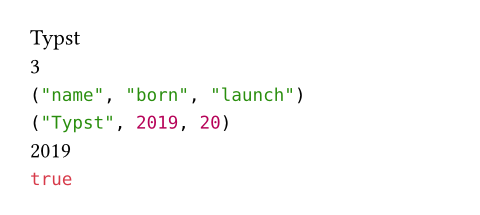このページはまだ翻訳されていません。原文の内容が表示されています。
dictionary
A map from string keys to values.
You can construct a dictionary by enclosing comma-separated key: value
pairs in parentheses. The values do not have to be of the same type. Since
empty parentheses already yield an empty array, you have to use the special
(:) syntax to create an empty dictionary.
A dictionary is conceptually similar to an array, but it is indexed by
strings instead of integers. You can access and create dictionary entries
with the .at() method. If you know the key statically, you can
alternatively use field access notation (.key) to
access the value. Dictionaries can be added with the + operator and
joined together. To check whether a key is present in
the dictionary, use the in keyword.
You can iterate over the pairs in a dictionary using a for loop. This will iterate in the order the pairs were inserted / declared.
Example
#let dict = (
name: "Typst",
born: 2019,
)
#dict.name \
#(dict.launch = 20)
#dict.len() \
#dict.keys() \
#dict.values() \
#dict.at("born") \
#dict.insert("city", "Berlin ")
#("name" in dict)

コンストラクタ引数引数は関数への入力値です。関数名の後に括弧で囲んで指定します。
Converts a value into a dictionary.
Note that this function is only intended for conversion of a
dictionary-like value to a dictionary, not for creation of a dictionary
from individual pairs. Use the dictionary syntax (key: value) instead.
#dictionary(sys).at("version")

value
The value that should be converted to a dictionary.
定義定義これらの関数や型には、関連する定義を持たせることができます。定義にアクセスするには、対象の関数や型の名前を指定した後に、ピリオド区切りで定義名を記述します。
at
Returns the value associated with the specified key in the dictionary. May be used on the left-hand side of an assignment if the key is already present in the dictionary. Returns the default value if the key is not part of the dictionary or fails with an error if no default value was specified.
key
The key at which to retrieve the item.
defaultany
A default value to return if the key is not part of the dictionary.
insert
Inserts a new pair into the dictionary. If the dictionary already contains this key, the value is updated.
key
The key of the pair that should be inserted.
valueany必須引数必須引数必須引数は、関数を呼び出す際に必ず指定しなければなりません。位置引数位置引数位置引数は順序通りに指定することで、引数名を省略して設定できます。
The value of the pair that should be inserted.
remove
Removes a pair from the dictionary by key and return the value.
key
The key of the pair to remove.
defaultany
A default value to return if the key does not exist.
pairs
Returns the keys and values of the dictionary as an array of pairs. Each pair is represented as an array of length two.